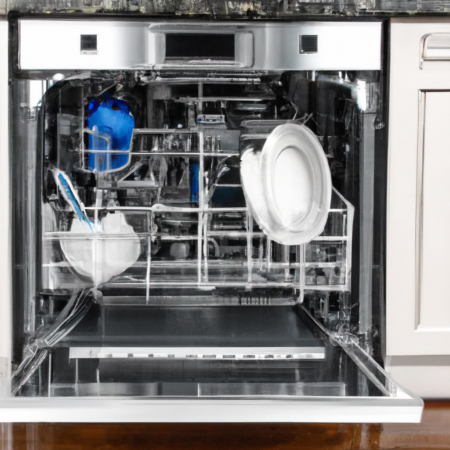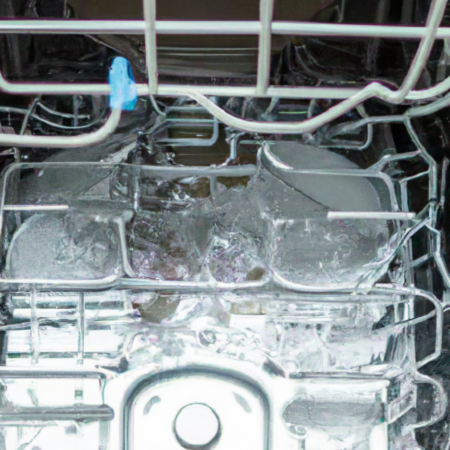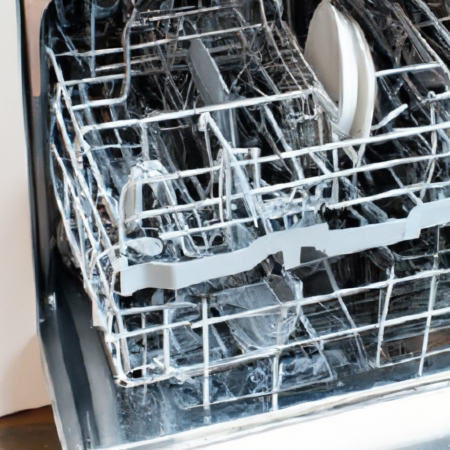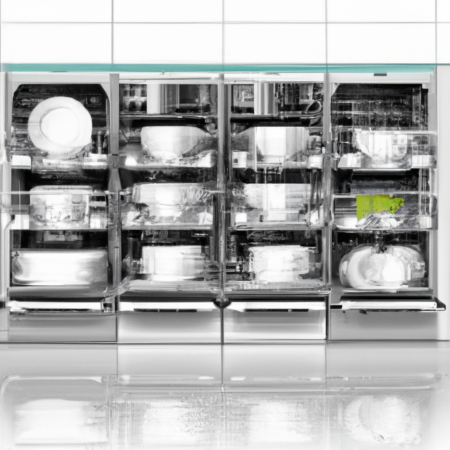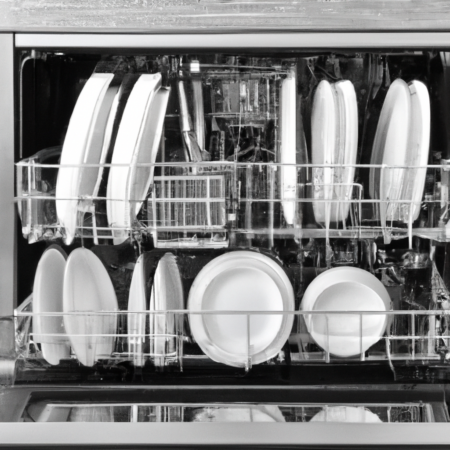Are you torn between the allure of sleek, integrated design and the practicality of a stand-alone appliance? The decision between a freestanding dishwasher and a built-in dishwasher can be overwhelming.
On one hand, you crave the seamless elegance that a built-in dishwasher offers, seamlessly blending into your kitchen’s aesthetic. On the other hand, the versatility and adaptability of a freestanding dishwasher are undeniably appealing.
Fear not, for we are here to guide you through this conundrum and help you find your sense of belonging in the world of dishwashing appliances. In this article, we will explore the key differences between freestanding and built-in dishwashers, providing you with the knowledge you need to make an informed decision.
From design and installation options to space and flexibility, cost and performance, we will delve into every aspect to ensure you find the perfect fit for your lifestyle and budget.
So, let’s embark on this journey together and discover which dishwasher will truly make you feel at home.
Key Takeaways
- Built-in dishwashers offer seamless elegance and blend into the kitchen’s aesthetic, while freestanding dishwashers offer versatility and adaptability.
- Built-in dishwashers require professional installation and match the surrounding cabinetry, while freestanding dishwashers come in compact models for smaller spaces and portable options for easy movement.
- Built-in dishwashers tend to be more energy efficient and have noise reduction features for quieter operation, while freestanding dishwashers may not have advanced features or custom panel options.
- Both types of dishwashers have impressive performance and features, and proper maintenance procedures can extend their lifespan. Common issues with dishwashers include clogged spray arms, leaking, and noisy operation, which can be troubleshooted and repaired.
Design and Installation Options
If you want a dishwasher that seamlessly blends into your kitchen’s design, go for a built-in dishwasher! These dishwashers are designed to be integrated into your kitchen cabinets, creating a cohesive and streamlined look.
When it comes to installation options, built-in dishwashers require professional installation to ensure a proper fit and functionality. They are typically installed beneath the countertop, with a front panel that matches the surrounding cabinetry. This allows the dishwasher to blend in seamlessly with the rest of your kitchen.
Design considerations are important when choosing a built-in dishwasher, as you’ll want to select a model that matches your kitchen’s style and color scheme. With a built-in dishwasher, you can achieve a polished and cohesive look, making it a popular choice among homeowners who desire a sense of belonging and unity in their kitchen design.
Space and Flexibility
When it comes to space and flexibility, you’ll find that a freestanding dishwasher provides more versatility than its built-in counterpart, allowing you to rearrange your kitchen layout like a game of Tetris. Freestanding dishwashers come in compact models that can fit into smaller spaces, making them ideal for apartments or kitchens with limited square footage. Additionally, they offer portable options, giving you the freedom to move them around as needed. This means you can easily change the location of your dishwasher based on your kitchen’s layout or your personal preferences. With a freestanding dishwasher, you have the flexibility to create a kitchen space that suits your needs and makes you feel like you belong.
| Advantages of Freestanding Dishwashers | Disadvantages of Freestanding Dishwashers | Benefits of Built-in Dishwashers |
|---|---|---|
| Compact and versatile | Limited storage space | Seamless integration into kitchen design |
| Portable and easy to move | May not have advanced features | Increased home value |
| Can be placed anywhere in the kitchen | May not have custom panel options | Built-in look for a cohesive aesthetic |
Cost and Budget Considerations
Affordability is a key factor to consider when budgeting for a dishwasher. When comparing the cost of a freestanding dishwasher to a built-in dishwasher, there are a few important factors to keep in mind.
Firstly, energy efficiency plays a crucial role in determining the cost of operating a dishwasher. Built-in dishwashers tend to be more energy efficient, meaning they use less power and water, resulting in lower utility bills over time.
Additionally, noise level is another consideration. Built-in dishwashers are typically designed with noise reduction features, ensuring a quieter operation compared to freestanding models. This can be particularly important for those seeking a peaceful and harmonious environment.
Ultimately, evaluating the cost and budget considerations of energy efficiency and noise level will help you make an informed decision when choosing between a freestanding and built-in dishwasher.
Performance and Features
You’ll be amazed at the impressive performance and array of features that will elevate your dishwashing experience to new heights.
When it comes to performance, both freestanding and built-in dishwashers offer efficient cleaning capabilities. However, built-in dishwashers tend to have more advanced features, such as customizable wash cycles and specialized cleaning options for delicate items. They also have better energy efficiency, consuming less water and electricity compared to freestanding models.
In terms of noise levels, built-in dishwashers excel with their soundproofing technology, ensuring a quiet and peaceful kitchen environment. This is especially beneficial if you have an open floor plan or enjoy entertaining guests while cooking.
So, if you’re looking for top-notch efficiency and energy consumption, along with a quieter dishwashing experience, a built-in dishwasher is the perfect choice for you.
Maintenance and Repair
To keep your dishwasher in tip-top shape, it’s important to regularly maintain and address any repairs that may arise. Troubleshooting common issues and extending the lifespan of your dishwasher are key elements in ensuring its longevity and optimal performance.
Here are some common issues you may encounter with your dishwasher and how to troubleshoot them:
- Clogged Spray Arms: If you notice that your dishes are not getting clean properly, it may be due to clogged spray arms. Remove the arms and clean any debris or mineral deposits that may be blocking the water flow.
- Leaking: A leaking dishwasher can be caused by a faulty door gasket or a damaged water inlet valve. Inspect the gasket for any signs of wear and tear and replace if necessary. If the water inlet valve is the culprit, it will need to be replaced.
- Noisy Operation: Excessive noise during the dishwasher’s operation can be caused by a worn-out motor or a malfunctioning pump. If you hear unusual noises, it’s best to have a professional technician inspect and repair the dishwasher.
By addressing these common issues and following proper maintenance procedures, you can extend the lifespan of your dishwasher and keep it running smoothly for years to come.
Frequently Asked Questions
Are freestanding dishwashers more energy-efficient than built-in dishwashers?
Yes, freestanding dishwashers can be more energy-efficient than built-in ones. They consume less energy due to their compact size and are designed to fit in small spaces without compromising on performance.
Can a freestanding dishwasher be converted into a built-in dishwasher?
Yes, a freestanding dishwasher can be converted into a built-in dishwasher. Converting offers advantages like seamless integration with your kitchen cabinetry, saving space, and enhancing the overall aesthetic appeal of your kitchen.
What are the benefits of a built-in dishwasher over a freestanding one?
Built-in dishwashers offer numerous benefits over freestanding ones. They seamlessly blend into your kitchen design, save space, and provide a sleek, integrated look. In contrast, freestanding dishwashers can be bulky and may not match your kitchen’s aesthetic.
Can a built-in dishwasher be easily moved to a different location?
Moving a built-in dishwasher to a different location can be challenging due to its lack of portability. It requires professional expertise to disconnect, uninstall, and reinstall in another area, ensuring proper connections and fit.
Is it possible to install a built-in dishwasher in a small kitchen with limited space?
In a small kitchen with limited space, it may be challenging to install a built-in dishwasher. However, you can consider installing a portable dishwasher or explore alternative options such as compact countertop dishwashers or drawer dishwashers.
Conclusion
In conclusion, when deciding between a freestanding dishwasher and a built-in dishwasher, it’s important to consider your design and installation preferences, space availability, budget constraints, and desired performance and features.
While freestanding dishwashers offer more flexibility in terms of placement and can be more cost-effective, built-in dishwashers provide a seamless and integrated look in your kitchen.
Remember, the choice between these two options ultimately boils down to finding the perfect fit for your needs and ensuring that your dishwashing experience runs like a well-oiled machine.










